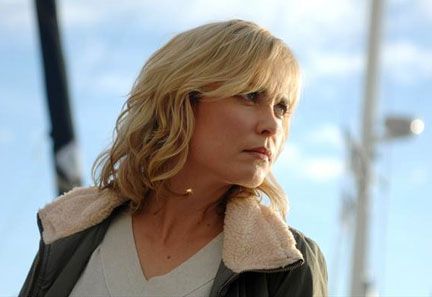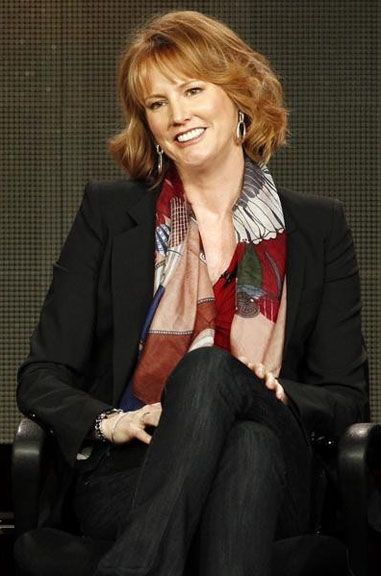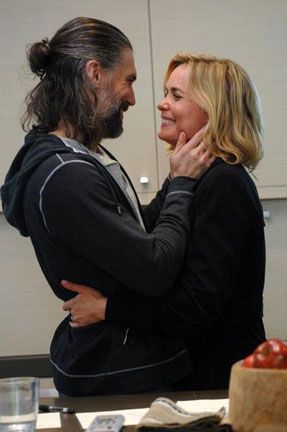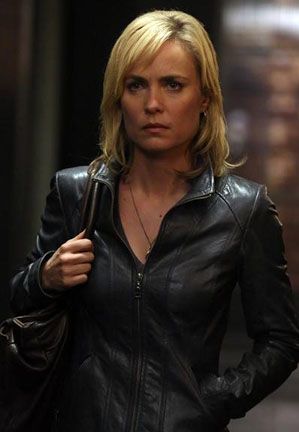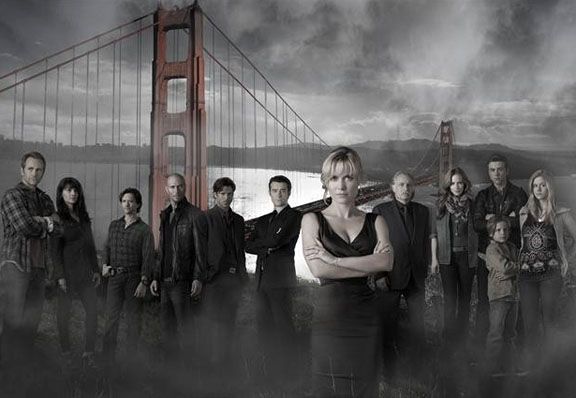From Melissa Rosenberg (screenwriter of the Twilight Saga films), the ABC drama series Red Widow illustrates just what lengths a single mother will go to, to protect her children when she feels as though their lives are threatened. When Marta Walraven’s (Radha Mitchell) husband Evan (Anson Mount) was brutally murdered in their driveway, it changed her idyllic life, in an instant. As a result, she now finds herself navigating the criminal underworld, in order to repay his debt to the formidable international crime boss, Nicholae Schiller (Goran Visnjic), and keep herself and her family alive. The show also stars Rade Serbedzija, Luke Goss, Lee Tergesen, Wil Traval, Jaime Ray Newman, Clifton Collins Jr., Suleka Mathew, Sterling Beaumon, Erin Moriarty and Jakob Salvati.
During this recent exclusive phone interview with Collider, executive producer/writer Melissa Rosenberg talked about what immediately stood out for her when she watched the original Dutch series that the show is based on, what made Radha Mitchell the perfect actress to center this story around, the challenges of making a flawed and slightly morally ambiguous character likeable to audiences, and how many of the questions will be answered by the end of this season. She also talked about what made her want to sign on as executive producer for Big Thunder, based on the Disney roller coaster ride and set in a frontier mining town run by a powerful but mysterious tycoon, how much she’d still love to see AKA Jessica Jones make it to series, and that she’s still developing the feature film Earthseed, adapted from a young adult novel, at Paramount. Check out what she had to say after the jump.
Collider: When you watched the original Dutch series, Penoza, what immediately stood out for you?
MELISSA ROSENBERG: Well, the thing that stood out to me the most and the reason I wanted to do this was because of that lead character. In the Dutch series, she’s this incredibly complex, flawed, occasionally morally ambiguous woman who’s also dedicated to her children. There’s these dualities that exist within this woman, and that was just so compelling to me. I just wanted to write stories for her.
Now that the networks have taken some notice of why cable is more successful and they’re taking more risks and allowing for more high-concept shows with shorter seasons, does it feel a little closer to the work you were doing on Dexter?
ROSENBERG: Oh, absolutely! I’d been in network for a long time before I ended up on Dexter, and I swore I’d never go back to network. You have these time frames to do some good storytelling. But then, ABC came to me with this project and I was like, “I can’t walk away from this. This is just too delicious!” When Paul Lee, who runs ABC, brought it to me, I was like, “This is cable. You can’t do this on network.” He’s very interested in bridging the gap between network and cable. No one at ABC ever pulled me back from the edge with this. All the writers and I broke it like cable stories, and we really approached it, in that way.
Were there any particular challenges in telling a season’s worth of story, in only eight episodes, or do you feel like that worked to your advantage?
ROSENBERG: It worked to my advantage. Oftentimes, even when you’re doing 12 or 13, there’s always that one episode where you’re treading water, a little bit. With eight, you’re leaving it all on the floor. You’re just packing story in there. You have so much opportunity. There’s never a dull moment. So, each one of those eight episodes, to me, is just a little jewel. No one is the same as the next.
A lot of people were interested in this show specifically because of Radha Mitchell. What was the casting process like, for that role? Did you know what you wanted, in an actor?
ROSENBERG: I thought I knew. The star of the Dutch series was a much older woman, in her late 40's, so in my mind, that’s what it had to be. Our director, Mark Pellington, had worked with Radha before and brought her up, and I was like, “No, she’s too young! She’s still in her 30's. No woman in her 30's is going to be willing to play the mother of three children, one of which is a 17-year-old.” But, he kept on going, “I’m telling you,” and suddenly, I did this complete turn-about and realized, “Oh, my god, of course she should be younger! It’s even sexier and she’s even more vulnerable, and it makes it that much more complex that she’s a young widow.” Not that being in your late 40's is old. Being that myself, I would not say that. The second I made that mental shift from what I thought it had to be versus what it actually should be, Radha was absolutely the one. The thing about her, and what is so right about her, is that she has this invisible acting style. She’s so naturalistic, she’s so authentic and she is emotionally naked. As an audience member, you have complete access to her inner life. There’s no separation. Not only that, but she’s unbelievably lovely to work with and very collaborative. I just got really lucky. There’s no other person I would have wanted to work with. She is this character.
When you have a character like Marta Walraven, who is very human, is it challenging to find a balance in making sure that she has a certain strength, but never seems too superhuman, so that audiences still feel compassion for her?
ROSENBERG: Oh, yeah! That’s the challenge when you’re writing a female character that is flawed, makes mistakes and is slightly morally ambiguous. You have to keep the audience rooting for her while she’s making some pretty dicey decisions and doing some pretty dicey stuff. The answer for me was that every single move she makes is about protecting those children. It may be misguided, misinformed and a huge mistake, but if the audience understands why she’s doing it and is saying, “You know what? I actually probably would have made the same decision,” that’s what we hope to achieve. We want the audience to be with her for the ride and rooting for her. If anyone can get the audience rooting for them, it would be Radha.
Since he made such an impression in the pilot and they had such great chemistry, did you ever seriously consider bringing back Anson Mount, even if it were just for flashbacks?
ROSENBERG: It’s funny because Evan was the last role that we cast because it was just a guest star, so I actually didn’t even think about it. Jeremy Gold, over at Endemol, said “I can bring Anson over from Hell on Wheels,” and I said, “Good! Great! Fine!” So, it was a complete surprise for me that he was as perfect for this as he was, and that the chemistry was so extraordinary. You could touch that chemistry. It was incredible! And he’s so beautiful and talented that I thought, “Oh, my god!” The minute I first saw them on film, I was like, “Oh, no! The audience is going to tune out after Act 2!” But, if they tune in for a couple more acts, when they get to the end, Goran Visnjic walks into the room. For me, it’s about moving past Evan. He’s not in her life anymore, but the memory of him will be. I also didn’t want to undermine her strength by having the ghost of him advising her. But, I think Anson Mount is extraordinary and if it serves the storytelling to bring him back, I would, in a heartbeat. The question is, does it serve the storytelling? If you’re trying to advance the business arrangement and relationship with Schiller (Goran Visnjic), how can you be stuck in the past with someone? I just find that being stuck in the past is less interesting to me.
When you do a show like Red Widow, where the stakes are pretty high and it involves some violent people, do you have the freedom to kill off characters, when need be?
ROSENBERG: Yeah, I have total freedom with the show, beyond full frontal nudity and certain language. The show is called Red Widow, so there is probably one person you can’t kill off, and that would be the widow. But beyond that, this is a very dangerous world. Everybody is at risk. I have a very large ensemble, but the truth is that they are all incredibly talented. There is just not a weak link in this cast. There is no one that I would like to see go. So, if one of them does go, it is only because the storytelling asked for it. Sometimes you have an actor where you’re like, “You know what? That guy could die and I wouldn’t be sad to see him go,” but not on this show. So far, I want to keep them all around and close to me, for as long as possible. But, the thing about this series is that the storytelling can go anywhere. There’s no limits, in terms of where we could push these characters.
How much of the story do you wrap up, by the end of this season, and how much do you leave open for future seasons?
ROSENBERG: For sure, we will find out who killed Evan, by the end of this season. And we will find out what happened to the cocaine. I guarantee you that we will answer those questions. But, the third question of the series is, how will Marta extricate herself? That’s a series long question. By the end, we answer some questions, but we also open up new storytelling possibilities that will hopefully intrigue people enough to come back for a second season.
Do you want to continue to do short seasons, if the series gets picked up?
ROSENBERG: Yes. We’ve talked about that extensively with the network and the studio. This kind of a series does not really lend itself to 22 episodes. It’s not a case-of-the-week engine. It’s all very character-driven, and if you start pushing characters to the degree that we have, for 22 episodes, you’re going to have an evil twin by episode 18. Because it’s more cable-eque, I think it lends itself to a 12 or 13 episode order. Any more than that, you start really getting thin and fantastical, in terms of what everyone is going through. When we started talking about this, when I first came in, they saw it as that kind of a series, as well.
How will signing on for Big Thunder affect your work on Red Widow, especially if both shows get picked up?
ROSENBERG: Well, Red Widow is my child and I’ll always run that, certainly until it’s running itself, which rarely happens. If they both went, I would be executive producer on Big Thunder, in a non-writing capacity. I would just pop in. Red Widow is my focus, as a writer.
With Big Thunder, how did you wrap your head around working on a show based on a roller coaster?
ROSENBERG: I’m sure (screenwriters) [Terry] Rossio and [Ted] Elliott asked themselves the same question when they were doing Pirates of the Caribbean, and that turned out all right. The young writer who came to ABC with a good pitch for Big Thunder was Jason Fuchs, and he had a really fun and magical take on what to do with it. It was really fun! I love how different it is from Red Widow. I love stretching into different worlds, and this is a fantastical world. It’s a western mining town set in 1890 with a magical element. It’s very high-concept, and a much different tone. Big Thunder could be on at 8 o’clock, whereas Red Widow could never be on at 8 o’clock.
With the traction that Marvel is getting in television now, is there still a chance for AKA Jessica Jones to make it to series, as well?
ROSENBERG: Your mouth to God’s ears! I would love that! I’m not sure it will ever be an ABC show. I don’t think it’s necessarily a great match there, although ABC Studios owns it, so it could be an ABC Studios show. We’re looking to find a home for it. It is a show that could easily be on cable. If you’ve ever read Brian Michael Bendis’ fantastic series, it is the first adult series that Marvel ever put out and it’s pretty edgy, in a fantastic way. I love that character, and I would love to do that series somewhere. If I can make that happen, I will. I love it, and continue to love it. It just needs a home.
Do you also currently have any films in development?
ROSENBERG: I do, actually. I have a project, called Earthseed, at Paramount that I’ve had there for awhile. I had written a draft of it and was just about to start writing a second draft when Red Widow landed in my lap, and then got picked up, and that was my year. So, I ended up taking on another writer, Evan Daugherty, who wrote Snow White and the Huntsman, to take that film, which I’m also a producer on, to the next level. He and I have worked together before. I’ll be jumping back on that and staying involved.
As you get more involved with the TV deal that you have with ABC, does your film career have to get pushed to the back burner a bit, or will you work to keep a balance between the two?
ROSENBERG: I’m trying to find a balance between the two. When I was doing the first three Twilight films, I wrote all three of those while I was working on Dexter, but I wasn’t running that show. I was a writer, but I wasn’t running it. And then, when I was doing the last two Twilight films, I had to leave Dexter, unfortunately, because I just couldn’t do both. Running a show is a whole other ball of wax. That is a 29-hour a day, 10 day a week job. It has been a little bit harder to juggle those things. But, I’m quite in love with the project at Paramount, so I’m not abandoning that. TV is very much my first love. I love this world. It’s where writers have the most creative control, and I just love that.
Red Widow is on Sunday nights on ABC.

